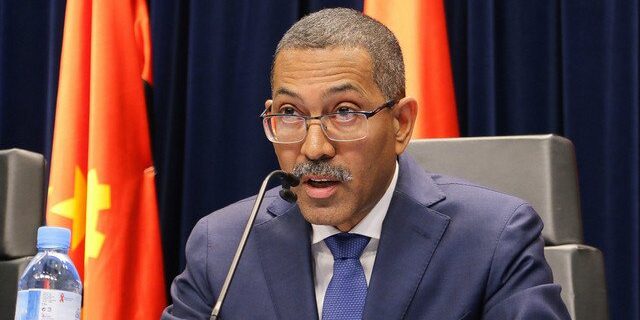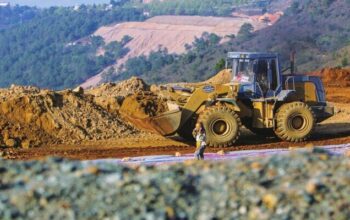The Minister of Mineral Resources, Petroleum, and Gas (MIREMPET), Diamantino Azevedo, encouraged operators to invest more in the petroleum sector in Luanda.
One of the important indicators, he explained, for us to assess the work in exploration is the number of drilling rigs.
We want to see more rigs drilling the Angolan soil next year, which is a challenge to all who can take advantage of the opportunities provided by Angolan legislation. “With the changes we made in the last term, the introduction of technical and financial incentives has allowed for more openness to investments in this sector.”
Diamantino Azevedo advised potential investors to regularly approach the National Oil and Gas Agency to learn more about all the existing opportunities. In turn, the agency will be responsible for promoting opportunities more extensively.
One of them, he mentioned, is the ongoing bidding process, with submissions due in September of this year. There are 12 blocks in two onshore basins in the country, basins with a proven track record, and I hope some of those present will also participate in this bidding process.
The Minister also praised the initiative of young Angolan entrepreneurs in the petroleum sector. “We have good examples of young people who, despite the current situation in the sector, are taking convincing actions that indicate that the new law implemented in 2020, in the current context of the industry, has allowed for the creation of local content.”
He stated that they are aware of the current difficulties, and they have been working with sector associations and entrepreneurs to ensure that even in this challenging context, local companies increasingly take a significant share of the business in the oil industry.
As part of the celebration of the 63rd anniversary of OPEC, Diamantino Azevedo stated that Angola has played an important role since joining the organization in January 2007.
“The fact that Angola became a member of OPEC was a significant advantage, contributing to a new dynamic in the organization.”
He explained that Angola’s presence in OPEC will always be aligned with Angola’s strategic interests in the petroleum sector.
The importance of oil is evident in our daily lives and plays an indispensable role in economic growth, sustainable development, and improving the livelihoods of thousands of people worldwide.
Over a period of approximately 26 years, Angola had the opportunity to preside over the OPEC conference on two occasions, first in 2009 and then in 2021.
Production Angola’s Relevant Role in OPEC
The Secretary-General of the Organization of the Petroleum Exporting Countries (OPEC), Haitham Al-Ghais, highlighted in Luanda the role that Angola plays as a member of the organization.
“We are very pleased to celebrate the 63rd anniversary of OPEC in Angola. For us, it demonstrates the importance of Angola as a member country of the organization,” he said.
Al-Ghais emphasized that Angola plays a crucial role as a major African producer with significant reserves of oil and gas, along with the potential for development in the petroleum sector.
“With the strategies that I have heard in these two, three days here from the Ministry and the National Oil and Gas Agency, Angola has the opportunity to increase gas and oil production, which can benefit the country’s economy.”
One of the organization’s objectives, he added, is to help increase the development of member countries and the global economy. Angola’s involvement aims to maintain stability in the global oil market.
He advocated for more investment in the sector to meet future demand. Al-Ghais stressed the need to invest more to reduce emissions, stating that the world’s population is expected to grow by about 2 billion by 2050, which will require more energy.
He explained that currently, nearly 80 percent of the global energy mix consists of oil and gas. Oil investment alone accounts for 30 percent and is expected to continue until 2045-2050.
Therefore, he emphasized that this is not only a challenge for member countries but for the entire world in the context of sustainable economic development for countries linked to the sector.
Strategies Operators Discuss Net Decarbonization Goals
A panel discussion held during the first day of the Angola Oil & Gas Conference and Exhibition (AOG) 2023 provided valuable insights from major oil and gas companies operating in Angola. They discussed decarbonization strategies amid net-zero goals and global trends in the upstream sector. Under the theme “Forging New Paths: Decarbonizing Oil and Gas in Angola,” the panelists also explored new investment opportunities to offset production declines while ensuring a sustainable future for Angola’s oil and gas resources.
Moderated by Manuel Mota, Partner and Leader of Climate Change and Sustainability Services at EY, the panel featured Adriano Mongini, CEO of Azule Energy; Edson dos Santos, CEO of Etu Energias; Billy Lacobie, General Manager of Strategic Business Unit for Southern Africa at Chevron; Ricardo Van Deste, CEO of Sonangol E&P; and Mutombo Dondo, Deputy General Director and Asset Director of TotalEnergies E&P Angola.
The oil and gas sector in Africa faces the dual challenge of meeting growing energy demand while reducing emissions. As the largest independent producer of oil and gas in Angola, the CEO of Azule Energy emphasized the company’s commitment to decarbonize its operations and maximize production efficiency.
“In terms of decarbonization, the two biggest assets in the production process are reducing flaring and emissions,” said Mongini, adding, “In our new implementation, we are introducing a new floating production, storage, and offloading (FPSO) unit in 2026. In this new FPSO, we have implemented all the latest technologies to decarbonize and maximize efficiency.
Regarding reducing harmful emissions, the private oil company Etu Energias, through its CEO, outlined the company’s strategy to participate in carbon emission reduction while ensuring operational efficiency.
“We genuinely seek to care for the environment, but we always prioritize what helps us from a financial and operational perspective,” explained dos Santos. “First, we look at reducing flaring. Second, we focus on leak detection. Third, we have made significant efforts in tree planting to remove carbon from the atmosphere. And if I were to add a fourth point, it would be using carbon dioxide to enhance oil recovery efforts.”
Meanwhile, exploring the role that the National Oil Company (NOC) of the country, Sonangol, will play in advancing Angola’s energy market expansion agenda within the context of a fair and inclusive energy transition, Van Deste described the NOC’s decarbonization strategy and how technology will play a stronger role in the country’s sustainability goals.
![]()




